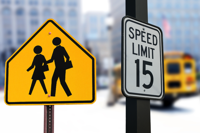
Photo by Amairani Hernandez
As a first-time parent I have had so many learning experiences with my first-born child, from changing diapers to breastfeeding to now potty training. Now that public schools are enrolling 3-year-olds in preschools, teaching our toddlers to use the bathroom independently is important.
Us parents love seeing all these new exciting milestones, but this one in particular will probably be the hardest for me as it can require days of training. As the default parent this will be a challenging experience for me and also scary to say the least.
Most moms say their children are potty-trained between 18 months and three years old, but this can vary depending on each child's readiness. In the last year, my two-year-old toddler has shown some signs that he may be ready to start potty training.
Around 18 months, Levi started to tell us whenever he had pooped. As of recently he started to tell us again whether he had pooped or peed on his diaper as well as pulling it down. I heard this is when his diaper starts to feel uncomfortable to them. He has also shown curiosity in being in the restroom with me and trying to flush the toilet too.
According to the pamper’s website, potty training can be a complex process and tricky as well when it comes to approaching the right training method. “Every child learns differently, boys may learn differently from girls.”
If your toddler shows two or more of the following signs, it's a good indicator that your son or daughter may be ready for potty training:
Hiding to pee or poop in a corner or suddenly disappearing
Pulling down a wet or dirty diaper
Interest in being in the bathroom alone or with a parent
Having a dry diaper for a longer time than normal
Telling us that they need to use the bathroom or that they just went to the bathroom while having a diaper on
Potty training is a journey you and your child will take together. As much as I’m scared for the messes and accidents there will be, I know it can also be a fun experience for both of us and the whole family.
When I spoke to some of my mommy friends they also warned me about the worst times you can possibly potty train or when not to push the training.
Here are some examples:
Being sick
Starting daycare
Moving into a new home
During the holidays or big events happening
No longer nursing or feeding from a bottle at bedtime
Experiencing the birth of a sibling. Toddlers find it difficult to adjust to many changes at home
Transitioning from a crib into a toddler bed. This transition can already be a lot to deal with as a parent and as a toddler
As I approach this training with my son, I have considered the three-day potty-training method, which is kind of like a potty training boot camp for my toddler. This method requires a strictly timed schedule, which can put my toddler under quite a bit of pressure. This method doesn’t work for every parent or child but it’s worth trying.
All children take part in milestones as they grow older, including becoming more responsible, independent, and self-assured. Each year, you’ll see that your child will want to do more and more on their own. Almost all skills your child will acquire require developmental readiness, including potty training. So, keep patience; when the time comes, your fast-growing big kid will be in the process of being potty trained just like mine! Stay tuned for the second part of my son's potty training journey.
If there is anything I can help young mothers and fathers with, please don’t hesitate to reach out to me at amairani@latinomedia.org. Follow my Mami & Me column here.











(0) comments
Welcome to the discussion.
Log In
Keep it Clean. Please avoid obscene, vulgar, lewd, racist or sexually-oriented language.
PLEASE TURN OFF YOUR CAPS LOCK.
Don't Threaten. Threats of harming another person will not be tolerated.
Be Truthful. Don't knowingly lie about anyone or anything.
Be Nice. No racism, sexism or any sort of -ism that is degrading to another person.
Be Proactive. Use the 'Report' link on each comment to let us know of abusive posts.
Share with Us. We'd love to hear eyewitness accounts, the history behind an article.